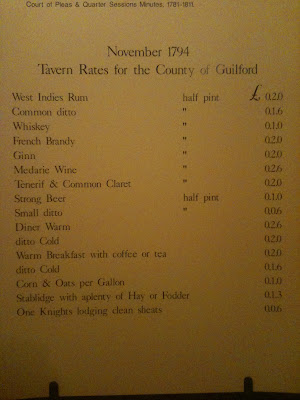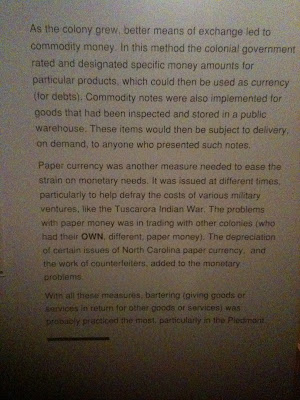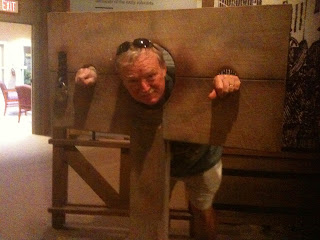All prices until after the Revolutionary War were in English pounds. Below are the Tavern Rates for the County of Guilford in November, 1794 compared to today's U.S. dollars. Almost $20 for a half pint of rum, but you could have lodging (for you OR your horse) for about $3. Check out the price for a half pint of brandy!!!
The price of a meal hasn't changed all that much.
The British tried to control the colonists by manipulating currency (how people pay for things):
"There is no money; every one buys and pays with their commodities, of which corn, pork, pitch, and tar are the chief." The British encouraged provincial dependence through various trade regulations, and by prohibiting the exportation of hard (coin) money from England.
So, no hard coin money resulted in commodity trading known as commodity notes. Product "x" equaled a designated value and "notes" were issued accordingly.
There was paper money, but counterfeiting was pretty simple back then (no special paper or inks) and there was no consistency of value between colonies.
A little friendly, neighborly bartering seemed the most reliable way to conduct business. So, you grew your crop, harvested it, and took it to the nearest mill. Those mills were almost always driven by water, and we thought the three different ways water turned the gears that moved the millstones that ground the grain was interesting.
Just in case you ever wanted to build your own I thought I'd include a diagram of how it works. :-) I supposed you could attach an ox or horse to make things go round and round, but water seems like the best idea to me.
So, you have your grain, and you bring it to the mill.
The owner can give you credit for all the grain, or you can have it ground up and he can keep some for himself as payment for his work. Now you have flour or oatmeal that you can barter to someone else for, say, a new plow - or to the blacksmith for repairing your old plow!
If you're a fisherman at heart instead of a farmer, you might use one of the these traps to catch a bunch of fish and have your own product to trade for flour.
If you were a rancher raising cattle - I'll give you flour to make bread with if you'll give me beef to eat (ribeye, please!) EVERYone is happy; the rancher isn't a "sod-buster" and the fisherman isn't tied to any particular piece of land, but everyone gets to eat and pursue "life, liberty, and ... happiness" in his own way.
However, if you didn't pay your debts, guess what happens:












No comments:
Post a Comment